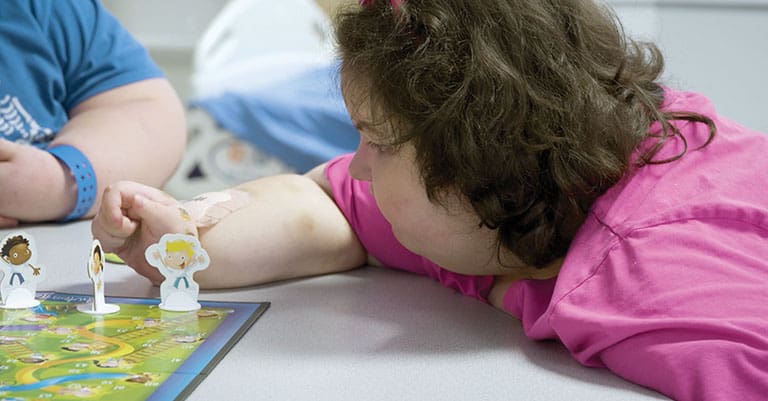For individuals living with Prader-Willi Syndrome (PWS), health problems often go beyond weight gain and maintenance. PWS is a rare genetic disorder that can cause learning and behavioral issues in addition to health problems related to obesity and weight gain. PWS is caused by an abnormality on the 15th chromosome, and genetic testing is required to make an accurate diagnosis. As the only nationally recognized program for children with PWS, our experts provide personalized treatment plans to help young people develop lifelong management strategies.
Approximately one in 12,000 to 15,000 people have PWS, according to the Prader-Willi Syndrome Association. Once diagnosed, individuals need a treatment plan that reinforces positive food security behaviors along with physical, behavioral, and speech therapies as needed. Nexus Children’s Hospital offers the only inpatient treatment program for children and young adults with PWS. Our clinical experts help young people set and achieve goals, even if they have been unsuccessful in traditional outpatient weight management programs in the past.
The key to successful, lifelong PWS management is a thorough understanding of an individual’s unique comorbid medical issues and behavioral complications. Each person with PWS is unique, and some common comorbidities include Type II diabetes, obstructive sleep apnea, edema, intertrigo, and venous stasis disease. Addressing these issues and developing healthy habits requires a custom combination of a calorie-controlled diet, physical activity that can be maintained over time, behavioral health support, and a daily schedule that supports healing and wellness.
One of the most important PWS management strategies is addressing weight control and obesity-related health issues. A dietician can help put together a calorie-controlled eating plan that incorporates an individual’s preferred foods while setting healthy eating patterns. People with PWS may not be able to accurately gauge when they’re full, or they may have food insecurity issues that cause them to overeat, so addressing behavioral health around eating is an important part of ongoing PWS maintenance.
Another strategy includes incorporating physical activity that is enjoyable and consistent. Finding activities, including sports and games or an individual workout routine, helps ensure health goals are maintained long term. Whether it’s participating in team activities or taking short walks, regular physical activity creates mental and physical benefits.
In the Nexus Jump Start Health and Wellness Program, our medical team includes registered dieticians, physical, occupational, and behavioral therapists, and specially trained clinicians. We believe in healing the whole child, from identifying health goals to charting a path toward successful management at home and in the future. When children leave our inpatient program, they and their families have the skills to maintain their health goals after discharge.
To find out more about living with PWS and the Jump Start Health and Wellness Program, contact us and schedule a complimentary tour!

